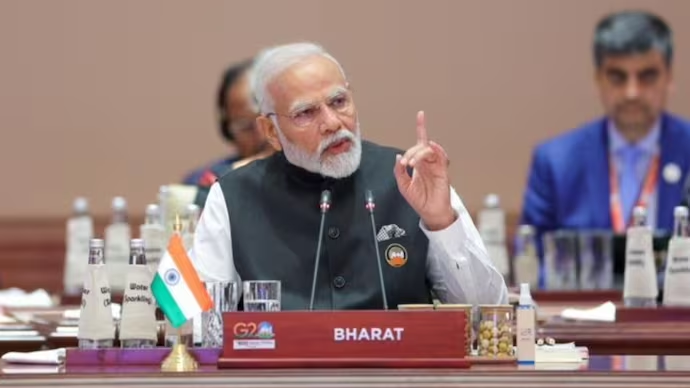Scratch to 100 cr turnover - Karnataka's Sparsh Masala rapid growth
February 6, 2026
February 20, 2026,4:20:14 AM

Amidst the ongoing debate between "Bharat" and "India," a significant statement was made during the G20 Summit, where Prime Minister Narendra Modi's nameplate bore the inscription "Bharat." The decision to replace "India" with "Bharat" on the invitation sent to world leaders by President Droupadi Murmu has ignited a substantial political controversy. Speculation has arisen that the upcoming special parliamentary session, scheduled for later this month, aims to formalize the transition from "India" to "Bharat."
Furthermore, the G20 summit featured a booklet titled "Bharat, The Mother Of Democracy," intended for foreign delegates, highlighting that "Bharat" is the official name of the country, as stated in the Constitution and historical discussions dating back to 1946-48.
The opposition parties have launched a vehement attack on the government over this matter, accusing the Narendra Modi administration of distorting history and creating divisions within the country. In response, BJP leaders have countered these allegations by branding the opposition as anti-national and anti-constitutional, pointing to Article 1 of the Constitution.
![]()
As the debate intensifies in anticipation of the undisclosed agenda of the forthcoming special parliamentary session, unverified reports suggest that a name change may be deliberated and potentially passed during the session. While ruling BJP members advocate for "Bharat" to take precedence over "India," opposition leaders argue that "Bharat" is already referenced in the constitution.
In the English version of the constitution's preamble, it begins with "We, the people of India…," and in Part One, it states, "India, that is Bharat, shall be a Union of States." In the Hindi version, "India" is consistently replaced with "Bharat," except in the section defining the country's name, which reads, "Bharat, that is India, shall be a Union of States." Changing the name of India to solely "Bharat" would necessitate a constitutional amendment, requiring a two-thirds majority in both houses of parliament.
![]()
The United Nations also weighed in on the matter, announcing that it will change India's name to "Bharat" in UN records once New Delhi completes the necessary formalities. According to the United Nations Secretary General's chief spokesperson, Stephane Dujarric, "When India completes the formalities to change the name, they will inform us, and we will update the name in the UN records."
In terms of historical context, both names, "Bharat" and "India," have ancient origins, dating back over two millennia. While some proponents of "Bharat" argue that "India" was a name imposed by British colonial rulers, historians contend that the name "India" has historical roots that predate colonialism by centuries. "India" derives from the Indus River, known as "Sindhu" in Sanskrit, and travellers, including those from distant places like Greece, identified the region southeast of the Indus River as "India" even prior to Alexander the Great's campaign in the 3rd century BCE.
On the other hand, the name "Bharat" is even older, appearing in ancient Indian scriptures. However, some experts suggest that it was primarily a term denoting socio-cultural identity rather than geographic location.
![]()
The effect of a country's name change globally, especially in the business segment, will vary depending on a number of factors, including the reason for the name change, the country's prominence in the global economy, and the way the name change is communicated.
On the positive side, a name change can help to improve a country's image and make it more attractive to tourists and investors. On the negative side, a name change can be disruptive to businesses that have already established themselves under the old name. It can also lead to confusion and uncertainty among consumers and businesses.
In the business segment, the impact of a country's name change will likely be most significant for businesses that operate internationally. These businesses will need to update their branding materials, marketing materials, and contracts to reflect the new name. They may also need to change their domain names and social media handles.
The cost of changing a country's name can be significant. It can involve updating government documents, changing signage, and rebranding products and services. The total cost will vary depending on the size and complexity of the country.
The impact of a country's name change on businesses will also depend on how the name change is communicated. If the name change is communicated effectively, businesses will be able to minimize the disruption and negative impact.
© 2024 Iconsofindianbusiness.com. All Right Reserved.